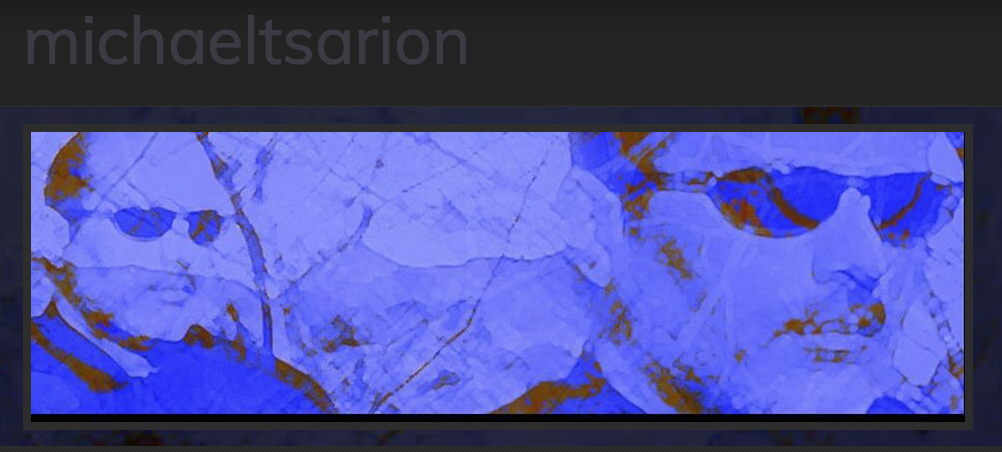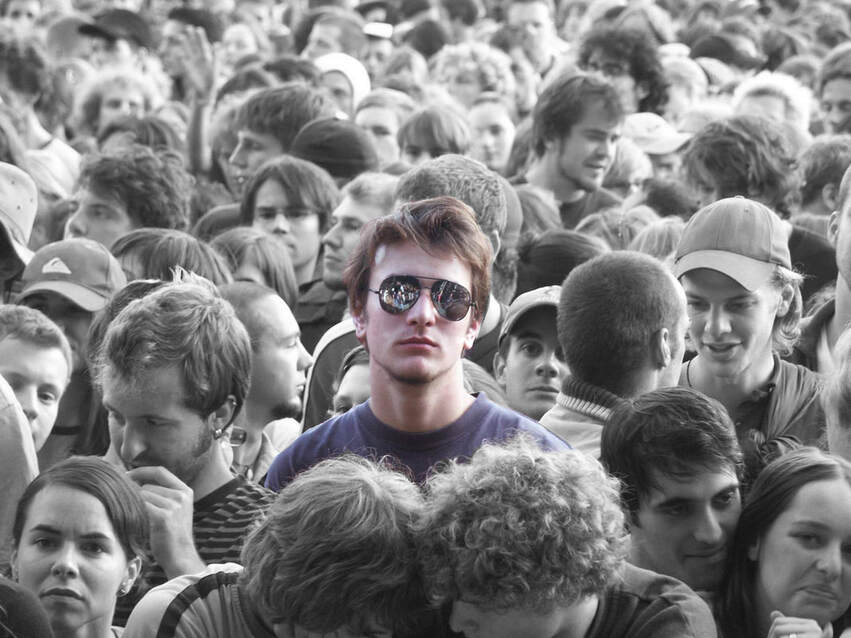PERSONALISM
& ITS ENEMIES
By Michael Tsarion
| To find out what is truly individual in ourselves, profound reflection is needed; and suddenly we realize how uncommonly difficult the discovery of individuality is – Carl Jung |
It is not possible for you to know what it’s like to be anyone but yourself.
You will never know what it is like to be someone else. You can ponder what it is like but you’re already off to a bad start, because the word “like” doesn’t really mean what it appears to mean.
The word suggets metaphor. What’s that about, one asks?
If all I am capable of knowing is what something or someone is “like,” then obviously I do not have direct access to what it truly is in itself. It’s actual identity remains strangely concealed. Why is this the case?
If I’m astute, I must ask this question, and find out whether there’s a good reason for things to be this way. Maybe if I was able to know what it’s like to be someone else, completely and distinctly, I’d lose the person I take myself to be.
Perhaps I’m here not to know what it’s like to be other people, but to be myself. Isn’t there enough mystery in this?
I can certainly see what I have in common with this or that person, but I’m not so clear on what makes my identity unique. Many people go through life never inquiring into this difference. Most people are afraid of being different from others in the world. It’s a cause of anxiety.
A few people realize the preciousness of individuality, and do their best to augment what it is that separates them from the Crowd. If this attitude is pursued to its extreme, one becomes something of an Outsider, which can lead to feelings of alienation. This in turn breeds its own kind of anxiety.
Sigmund Freud noted that there are basically two forms of anxiety, legitimate and neurotic. Paraphrasing Freud, we can say that there is legimate suffering and neurotic misery. The latter is experienced when we are unable to get approval from other people. We are flooded with guilt over not fitting in and behaving like them. One suffers from a Guilt-Complex.
Alternatively, we can also feel shame for conforming and doing as others do. Shame is not the same as guilt. Simply stated, guilt relates to our infractions against others, whereas shame is generated from within in response to violations committed against the Self.
From this we see that humans are morally divided beings. There are two opposing centers of morality – the superego and the conscience, and we endure a daily tug-of-war between them – between our duties to the world, to others, and our sovereign duty toward ourselves as Selves.
There’s bound to be conflict and pain either way. This is the extraordinary predicament facing humanity. It was the reason for the advent of psychoanalysis. One should be able to seek help when they feel flooded with shame or guilt.
| Animals cannot strive to change their behavior. Only human beings have the will and wherewithal to upgrade themselves. Only humans can Individuate, and know it. We change due to the pressures of the world, and because there’s something natural within us that strives for greater understanding and awareness. This organic process behind psychic progress is known as entelechy or teleology. It fascinated Jung as it had Aristotle centuries earlier. Since it is a phenomenon not ordained by the will, suggests that the so-called “unconcious” is not to be dismissed as unimportant and inconsequential. |
A simple solution to the problem of guilt is to not do as one likes. Doing as others do helps me fit in, and by fitting in I experience less anxiety. It feels good to belong and get the approval of parents, friends and associates. Life is a lot easier to handle. I don’t stand out, and don’t annoy others by honestly confessing how I see things. They don’t want to know anyway, and I just make a fool of myself trying to be “different.” I don’t want to rock the boat and have people avoid me.
Sadly, this conformist approach doesn’t work. I’m not at peace, because something within bugs me. It’s that pesky existential shame. Every time I act in a way that violates my true inner voice, I am beset with shame. There’s no way to alleviate it until I make the firm decision to be myself and speak honestly about my feelings and ideas. Doing so lessens feelings of shame, but ups my feelings of guilt. What a terrible predicament to be in.
This is the reason so many people today decide to take medication. The stress proves too much and one can no longer cope.
| Fast and furious lifestyles and fast and furious cures for all ills. Psychoanalysis was founded to help people who get flooded with guilt or shame. Sky-rocketing rates of medication dependency shows that people just want easy, convenient panaceas for all problems. They do not want to develop emotional intelligence or move beyond a recreational, episodic existence. |
But who or what is this “Self” sitting at the center of it all?
That question has plagued science for centuries, and is known as the “Hard Problem.”
Everything material that makes up a human being – the skin, muscle, bone, nerves and little grey cells, etc – cannot be said to be “conscious”. They function but do not “experience” anything. Even the brain, with its grey matter, lobes and neurons, isn’t the seat of any tangible biographical Self. Whatever Selfhood is, it does not seem to have an actual address in time and space.
Recently, however, advances in science have been made. Neuroscientists such as Mark Sohms and others now recognize that what constitutes a Self, isn’t intellect but feeling.
In English we don’t have too many words for feeling. Nevertheless, emotion or feeling is now acknowledged as the center of one’s being. What we know as subjectivity is entirely based upon it.
When we introspect, we willingly turn within, as it were, to assess how we feel about a certain person or situation. We do this constantly. We do it so much that we forget doing it. It’s so natural and effortless. However, according to Sohms, there’s another dimension to take into consideration when it comes to feeling.
There’s another kind of feeling action taking place all the time, that is natural but not willed. It’s what the body itself does to bring us the experiences making us who we are. This is known as introception.
What we know as intellect, thought and reason are, in fact, now understood as epiphenomena of introception or feeling. It’s known that the brainstem conveys feelings from the nervous system and body – up to 80 percent of the information processed by the brain comes from the soma.
As said, the process of introspection holds the key to the Hard Problem puzzle. When we go within our minds, it isn’t to think about things. It’s more a case of checking how we feel about them. We feel how we feel, and do so continually, hundreds of times a day. The object of this interminable self-reflexivity is biopsychic homeostasis. Once achieved we experience pleasure. When not achieved we suffer pain.
This fundamental process gave rise to emotion and also to intellect. It also gave rise to language. As said above, metaphors are a matter of spoken language. When I ask myself what it is “like” to be me, I am really speaking in metaphors. I’m not actually speaking of me at all, but what it’s “like” to be me. Due to the paradoxes of language I’m always talking about something other than what I intend talking about.
This begs the question, do I actually experience being me, or do I experience being something “like” me?
Perhaps there’s no answer to this question. Scholars such as Julian Jaynes and Erich Fromm, etc, insisted that the “me” is a very recent phenomenon. Identity as we know it is a late historical experience. Humans thought very differently in ancient times. Their concepts of “me” and “you” were not the same as ours. Many a Copernican Revolution in consciousess has taken place since the days of old.
| There was a time when rational present-day consciousness was not yet separated from the historical psyche, the collective unconscious – Carl Jung |
Where is the dividing line between you and me?
Despite the oddities of language and metaphor, most moderns have a continuous biographical sense of being. We intuit a past, present and future, and have personal needs and desires. Our bodies feel real and our memories are certainly ours. We have no difficulty distinguishing ourselves from others.
It might be said that the senses are also an extension of feeling. It’s not normal for us to think of perception as a kind of feeling. This is, however, consistent with the ideas of French philosopher Maurice Merleau-Ponty.
We don’t just see a world of objects, we feel them.
According to philosopher Martin Heidegger, our whole mental and physical make-up is determined by our Being-in-the-World. This state of being presumes a deep symbiosis between self and world. This was axiomatic to both Heidegger and Merleau-Ponty. Moods are, for example, proof of this nonconscious interconnectivity. For these men there is no such thing as a “Hard Problem.” Nor is there any validity to the subject versus object dichotomy, at least not in any hard Cartesian sense.
| French philosopher Maurice Merleau-Ponty (1908-1961), explored the deep connections between Self and World. His exceptional work on man as perceiver utterly undermines Cartesian notions of a hard divide between subjects and objects, Self and World. Modern science still has to honor his far-reaching findings. |
As Schelling said, hundreds of years ago, the so-called “object” is taken inside the mind, and thereby loses its objectivity. Likewise, the subject is so immersed in the world, that he too ceases to be a pure subject in any definitive sense. Being human, then, is to already be a being that nucleates opposites.
In other words, as the Existentialists see it, my subjectivity is composed of world, and what I call world is composed of Self. Better said, both World and Self are two expressions of a single reality, a single experience. There is certainly no hard distinction between them. Thus, a basic tenet of materialistic science is rendered null and void.
But again, as science now recognizes, what we call the subject is based on feeling. Therefore, what we call senses must be understood as emanations of this basal feeling state. By way of the senses we feel our world. We are selves within our environments and without our place of dwelling there can be no sense of Self.
Realizing this is vital, say the Existentialists, because it is from this “place” of being that we reach out to other people. They too occupy a world. It’s what everyone has in common. What makes people different is how they occupy their place of being. How does one “dwell” where they are? It determines not only how one relates to the rest of humankind, but to oneself as a Self.
The so-called “subject” is, therefore, not to be defined in the Cartesian way. The subject is not what it is because of its distinction from a world of external objects. What we call objects are not set apart from the subject in the way traditionally conceived. This is because every object encountered outside us has an enormous bearing on what we know ourselves as, or what we feel ourselves to be.
Objects in the world stand as all-important coordinates by which we judge our feelings about self and world. They are the means by which Selfhood is oriented. As Schelling held, the objective world is the means by which we become subjects. Similarly, the objective world is intimately articulated to the subjecthood emerging from it. This means that there is something mental about matter and something material about mind. Mind and matter are therfore to be understood as two expressions or polarities of a single principle, that of Spirit.
| Friedrich Wilhelm Joseph Schelling (1775-1854) is the world’s foremost forgotten philosopher. His profound ideas have been appropriated by dozens of later thinkers, often without citation. | |||
| …withdrawing into ourselves, the perceiving self merges in the self-perceived. At that moment we annihilate time and duration of time; we are no longer in time, but time, or rather eternity itself, is in us. The external world is no longer an object for us, but is lost in us – Friedrich Schelling | |||
Now that science has finally established the constitution of the Self or subject, the Hard Problem is no longer a problem.
The question remains, what does it mean for an individual to experience his or her Selfhood, now that it is something substantial enough to be experienced? Well done science! After hundreds of years the penny has dropped. Thanks for finally confirming that what I experience isn’t just a gas, the vapor of complex mechanical biological and nervous systems.
What I know about “myself” is primarily a matter of feeling. Moreover, the world I find myself occupying is also felt. It is not something standing outside or beyond me. Rather it is encompassed by me. What I call “I” is in the world as world is inside me. It is no longer a thing coldly and impersonally observed from a diistance.
Of course we know that science has never asked “how does one feel about the world?” It asks only what I “know” about it. That’s the new Hard Problem.
Thankfully, progress is being made. Mark Sohms, David Bohm, Iain McGilchrist Michael Gazzaniga, Bruce Lipton, Rupert Sheldrake, and many other top level scientists have sickened of scientism and are far more open to alternative viewpoints and theories about the nature of reality. They are keen to embrace the ideas of Existentialist thinkers and to reconsider the veracity of Cartesianism.
Hundreds of years ago David Hume refuted the foundations of materialistic science, showing that causality is merely a matter of assumption and contingency. His challenge has never been met. John Locke’s doctrine on the fundamental principles of science have long been overturned. Likewise his assessment of the nature of consciousness is also null and void. In other words, materialism is dead, and the top brass know it. It has been panic stations for some time now.
Hardline materialists turn to the lineaments of language in a last ditch effort to hold the fort and salvage what’s left of their bankrupt paradigms. George Lakoff, for example, explores the phenomenon of metaphor, to prove that we are nothing more than creatures of Darwinian evolution.
In Lakoff’s estimation we are simply creatures attempting to orient ourselves in a hostile world. We are subjects relating to wholly independent antithetical objects. In so doing we developed language. Our brains split and we develped communication skills via the Left-Hemisphere. Ironically, his description of the function of the Left-Brain in this regard contradicts his cherished theories on the nature of consciousness and role of language.
This is because the Left-Brain’s foremost job is to reduce and focus on the world before us. This means leaving out a great deal of content, both inwardly and outwardly. It follows that we do not refer to something so necessarily narrow and limited to learn anythjng substantial about reality and consciousness, not unless we’re involved in intellectual chicanery.
Lakoff does not address how our disorientation arose and why language is so “colorful.” Why all the metaphors? Why the displacement suggested in every metaphor? Why all the “likes?”
| When we speak, we also listen. The inner monologue is actually more of a dialogue between two inner selves – speaker and listener. Our language is excessively expressive and colorful. Is this due to Darwinian evolution, as neo-materialists profess? Why do we write poetry and love obscure jokes? When violent criminals develop better communication skills, they often cease committing crimes. Why is this? |
We’ve noted the peculiar fact that to be “like” something is to not be what one is. Why on earth develop such a language? Why call it “communication?” Why say that nothing is what it is, it’s always “like” something else? When we turn to that something else, it too turns out to be “like” something else.
What on earth is going on? Is anything or anyone known for what it is? Materialism says no!
It seems that we’re back to Kant’s impermeable wall between the known and unknown. Of course, the contradiction looms large. If there’s nothing to know at all, where did the “knower” come from? If life is only about survival and survival skills, why develop such an overwhelming drive to “know” about things if, as Lakoff holds, there’s nothing to know?
Well, this is what one gets when towers are burning. We get ideas that attempt to undermine the purpose for which humans exist. We get preposterous unfalsifiable notions such as String Theory, Multiverses and Virtual Reality, from men of science breaching their own supposedly sacrosanct rules. Science has long been about dogma and smoke and mirror play. It has long avoided the important questions, and has never acknowledged the supreme role of feeling. Indeed it has established itself by utterly negating it.
Centuries have been wasted. Science now finds itself confronted with the questions it previously rejected. What is it to be a Self? How does one express what it is to be a Self? Why create a language that makes the problem even worse, that leads us away from where we want to go?
Fortunately, we can now officially ask – if a thing cannot be known in itself, can it be felt for what it is?
What does the “knower” know and feel about themselves? How does one come upon their understanding? How does the psyche divide itself into subject and object, knower and known? How did our inner dialogue (or autologue) come about? Is the voice we hear inside our heads really our own?
Interesting questions to be sure – best not ask a Cartesian or Materialist for the answers.
| Man has developed consciousness slowly and laboriously, in a process that took untold ages to reach the civilized state…And this evolution is far from complete, for large areas of the human mind are still shrouded in darkness. What we call the “psyche” is by no means identical with our consciousness and its contents – Carl Jung |
Now that it has been established that feeling is the essence if not the cause of consciousness, a lot of obscure matters are clarified.
It is, for example, axiomatic that feelings cannot be shared.
Certainly, one cannot know what it is like to be another person, and just as certainly we cannot feel like someone else. This is where science gets off. If feeling is the bottom line, as Personalists hold, then they are hermetically sealed, so to speak. It is the individual who feels – who introspects and introcepts. He does so within himself, and for all the color of language he cannot really express his feelings to others. Moreover, the other is caught up experiencing their own feelings, every minute of the day and night. What we share are words and language, not feelings.
Schelling stressed the uniquenss of human beings. He described the age-old teleological movement from unconsciousness to consciousness to self-consciousness.
Only humans are lucidly self-conscious beings.
Indeed, to invent science and ask scientific questions about consciousness and reality presupposes self-consciousness. Therefore, implies Schelling, it follows that self-consciousness is the greatest mystery of all. Odd that it isn’t even considered by most people. This truly holy mystery isn’t important to people as they go about thinking, feeling and acting.
But as said, this is where science gets off. Whatever answers there are to this mystery – the mystery of the Self – they will not be discovered and broadcast collectively.
There is no end to the mystery of the Self. Schelling, Hegel, Blake, Barfield, Buber, Jung and others of their kind knew it. The Self is not a butterfly to be caught, killed and pinned to a board.
Jung would say that whatever one intuits about the nature of the psyche is afforded by the psyche. As he rightly declared, the psyche is not in us. Rather, we are in the psyche.
. . .




















